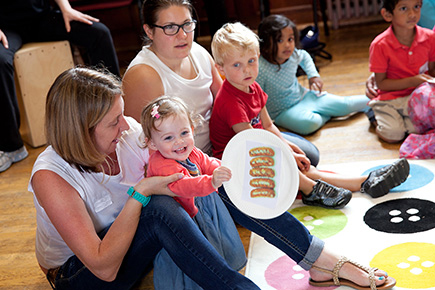Music and Motherhood
Monday 6 July 2015
Can singing really help banish the blues?
A new study announced today at the Royal College of Music aims to investigate the impact of singing among mothers experiencing Post-Natal Depression (PND).
With at least 75,000 cases of women suffering from PND reported each year in the UK alone, finding new methods for treating the condition has never been more important.
A consortium between the Royal College of Music, Imperial College London, CW+, Chelsea and Westminster Hospital NHS Foundation Trust, and Aeirtec Laboratories, this two-year research project has been awarded £199,916 by Arts Council England. The research will collect psychological, physiological and biological data in a randomised control design. It will also be supplemented by a national study tracking the interaction between mental wellbeing, symptoms of PND and involvement in musical activity in women during pregnancy as well as the first year of motherhood.
Dr Rosie Perkins, Research Fellow in Performance Science at the RCM, says "This project is perfectly placed to scrutinise whether music can contribute to relieving the feelings of anxiety, depression and fatigue associated with PND. Our multidisciplinary team can monitor mothers’ psychological, physiological and biological wellbeing, giving us a unique opportunity to inform the options available to women suffering from PND and to contribute to this previously under-researched area of arts and health."
The RCM has already worked with CW+ and Chelsea and Westminster Hospital for a number of years on projects relating to music making for health and wellbeing. Previous ventures have included a highly successful music and dementia programme reaching over 10,000 patients a year; and the Rhapsody project, an audio-arts guide tour of the impressive art collection at the hospital.
The Music and Motherhood study aims to inform the development of further musical activity for new mothers to combat PND. The findings are set to be shared internationally among health professionals, policy makers, researchers, arts organisations and the general public.
For further details, visit the Centre for Performance Science webpages.








